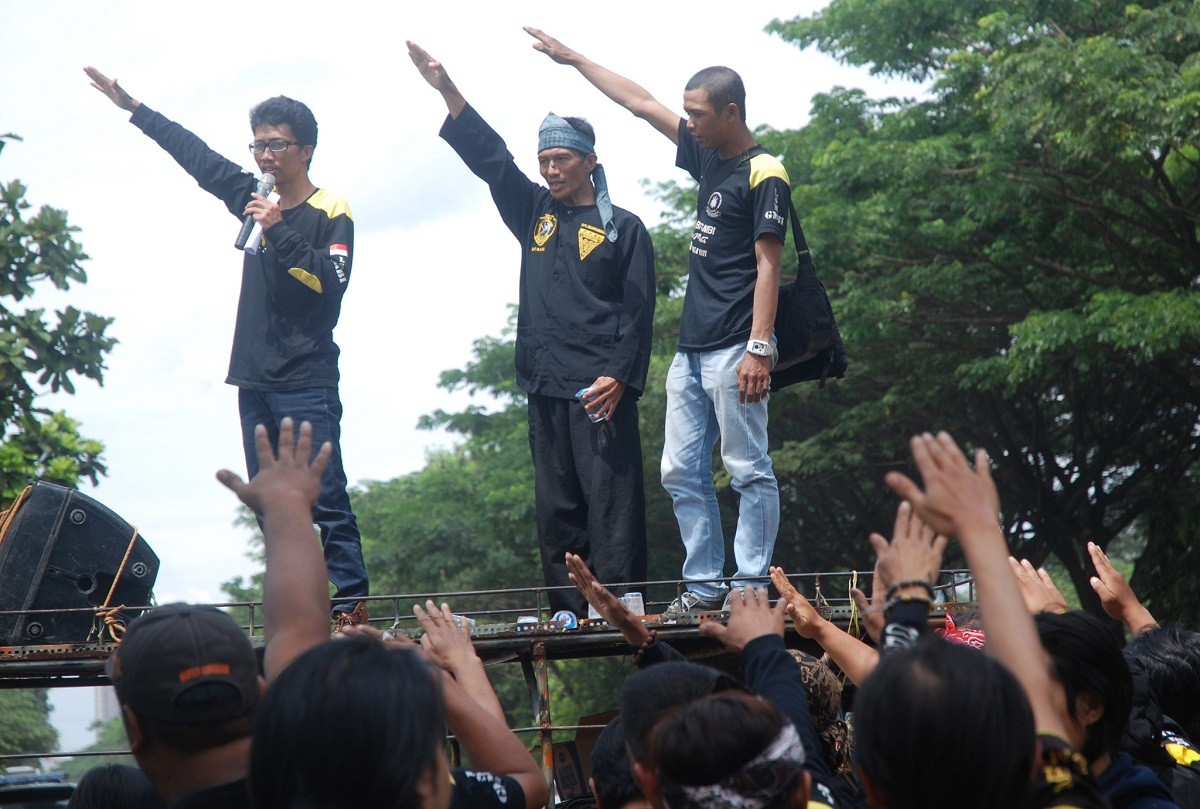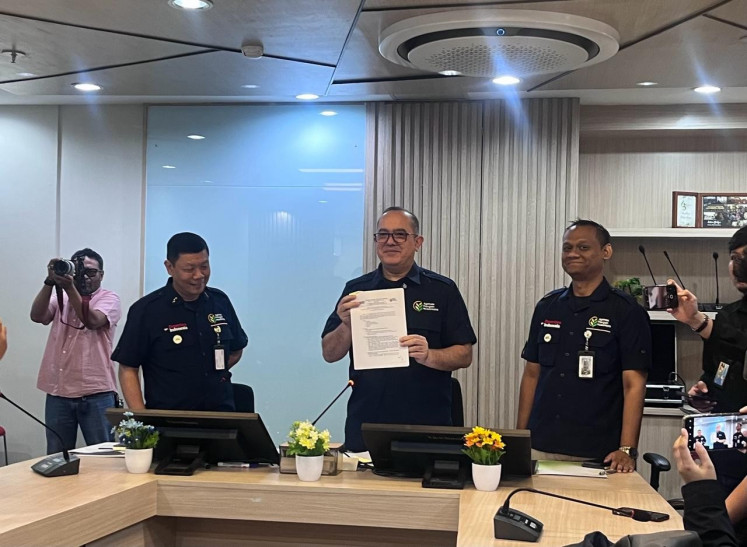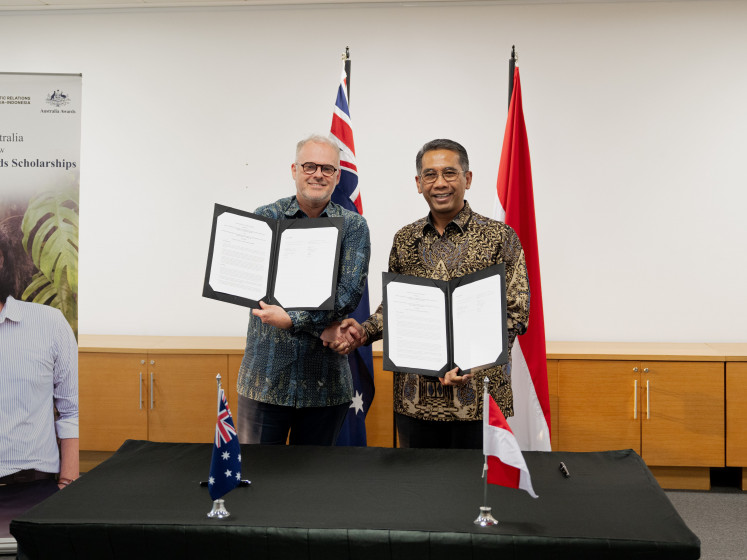Popular Reads
Top Results
Can't find what you're looking for?
View all search resultsPopular Reads
Top Results
Can't find what you're looking for?
View all search resultsFighting the hard-liners online
The FPI has proved adept in its use of social media platforms, running a sophisticated propaganda campaign. The group put a lot of pre-planning into its social media of how they moved their supporters from all around Indonesia.
Change text size
Gift Premium Articles
to Anyone
 Protesters stage a rally in front of the West Java Police headquarters in Bandung, West Java to protest defamation case implicating Islam Defenders Front chair Rizieq Shihab. The protesters urged the police to arrest Riqieq for defaming state ideology Pancasila and Sunda culture in one of the latter's sermons. (Antara/Fahrul Jayadiputra)
Protesters stage a rally in front of the West Java Police headquarters in Bandung, West Java to protest defamation case implicating Islam Defenders Front chair Rizieq Shihab. The protesters urged the police to arrest Riqieq for defaming state ideology Pancasila and Sunda culture in one of the latter's sermons. (Antara/Fahrul Jayadiputra)
G
lobal connectivity has brought many new opportunities, but it has also bred a new generation of threats. Many believe that social media is a mirror of society — one that reflects all manner of human interests and ideas, invariably extending into the realm of politics and violence.
Researchers have found that online behavior is dominated by “homophily”: a tendency to listen to and associate with people like yourself, and to exclude outsiders. People come together when facing a shared “antagonist” that they think is too strong to be faced by individuals. This behavior makes social networks bad at helping you empathize with people not like you.
People want their beliefs affirmed and they want to demonize the opposition at every turn. Social media platforms reinforce “us versus them” narratives, expose vulnerable people to destructive ideologies and even intensify long-dormant hatreds.
Cass Sunstein, an American legal scholar, says that people who hear only similar voices end up polarized. He also pointed to a wealth of evidence that suggests homogenous groups breed extreme views.
Nowadays, creating conflicts is as easy as putting our thumbs to our smartphones. The outcome of such conflicts will be determined heavily by activities in cyberspace. False news on social media is made to divide communities. Psychological operations are now tech-enabled.
Social media creates massive groundswells of popular opinion that are nearly impossible to predict or control. The invention of camera phones changed how we view conditions on the field and can shape such opinions. Worryingly, the more extreme the personality and sensibility of the author, the more popular he or she or a group is on social media.
The Islam Defenders Front (FPI) is an Islamic mass organization with an interesting violent history.
In 2011, armed with machetes and bamboo sticks, FPI members stormed the Ahmadiyah mosque and attacked the worshippers in South Sulawesi. At another time, the FPI successfully rallied to imprison the editor of Indonesia’s very tame version of Playboy Magazine.
The group even generated global headlines when it successfully prevented US pop star Lady Gaga from performing a concert in Jakarta by threatening to burn down the arena.
In the wake of depressing circumstances, many Muslims long for a strong leader who is brave enough to fight immoral behavior and able to unite the ideology and politically fractured ummah (community). The ultimate goal is to realize an Islamic state. The FPI smartly exploits this idea.
The big turning point for the FPI was its success in mobilizing and organizing thousands of people in relatively peaceful anti-Ahok rallies on Nov. 4 and Dec. 2. The protests did not degenerate into chaos as many had feared, and other big Islamic organizations and ulema even showed sympathy and support for them. Then, just like that, the FPI suddenly became an idol.
The FPI has proved adept in its use of social media platforms, running a sophisticated propaganda campaign. The group put a lot of pre-planning into its social media of how they moved their supporters from all around Indonesia.
The true purpose of FPI pictures or videos on organizing a rally on Twitter and Facebook is not to shock the authority; the purpose is to recruit like-minded zealots for their cause. The propaganda is designed to encourage like-minded communities to support the organization.
Twitter and Facebook are both open and public by nature. This means that the FPI has the ability to not only capture images, but also to spread them to the people who are likely to react to them and create a bigger impact. It also means the images will be in people’s consciousness forever.
Extremist groups have long used the internet to promote medieval ideologies. The Islamic State was a fantasy in 2004, now look at it. ISIS’ social media is capable of attracting people, including professionals such as doctors and not necessarily unemployed or illiterate people as widely believed.
Innovations in cyberspace in the commercial world have to be understood so that its impact on society, the military and the economy may be anticipated. Today’s government has to tackle all theaters of war, including cyberspace. The fight against violent or extremist messaging on social media has become more important than ever.
The rehearsal for the national audience has been accomplished with the success of two big demonstrations against Ahok in Jakarta. We do not know what the FPI is fully capable of, but we have seen them take down Jakarta in one night. If 2016 has taught us anything, it is to never underestimate how wrong anything can go. Remember, violent delights have violent ends.
---------------
We are looking for information, opinions, and in-depth analysis from experts or scholars in a variety of fields. We choose articles based on facts or opinions about general news, as well as quality analysis and commentary about Indonesia or international events. Send your piece to community@jakpost.com. For more information, click here.








